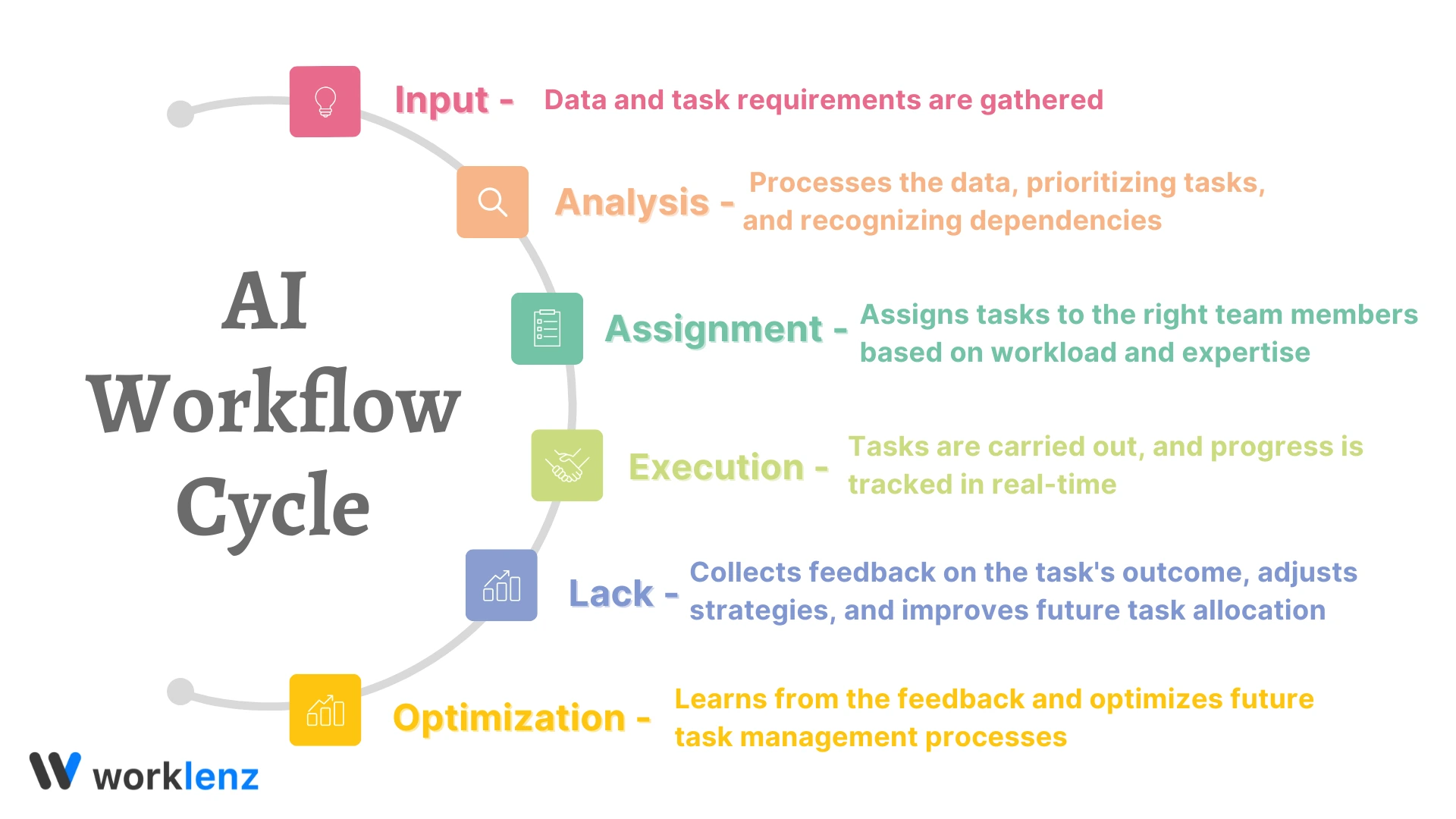
Did you know that by 2025, over 80% of project management tasks will be handled by artificial intelligence?
In an era where efficiency and profitability reign supreme, agencies are turning to AI-driven solutions to streamline their operations. AI is reshaping the project management landscape from automating mundane tasks to predicting risks. Buckle up as we explore how agencies can boost their bottom line through AI-powered task management!
Artificial Intelligence (AI) in project management refers to integrating smart algorithms and data-driven techniques to enhance project execution. It’s like having a digital project manager that can analyze, predict, and optimize tasks.
AI algorithms create efficient project schedules by considering resource availability, deadlines, and dependencies.
Smart resource allocation ensures the right team members work on the right tasks, maximizing productivity.
AI automates expense management, reducing manual effort and minimizing errors.
AI analyzes historical data to predict project risks, potential delays, and cost overruns.
Real-time analytics allow project managers to track progress, identify bottlenecks, and make informed decisions.
This enables AI systems to understand and process human language. Think chatbots, voice assistants, and sentiment analysis.
ML models learn from data, adapting and improving over time. They power recommendation engines, risk assessments, and more. Remember, AI isn’t just about automation—it’s about making smarter, data-driven choices.
AI algorithms analyze project requirements, resource availability, and task dependencies to create efficient schedules. It considers factors like deadlines, team capacity, and critical paths.
Impact: Agencies benefit from optimized project timelines, reduced delays, and better resource utilization. No more manual juggling of schedules.
Smart AI assigns the right team members to specific tasks based on their skills, availability, and workload. It ensures that expertise aligns with project needs.
Impact: Improved productivity, reduced idle time, and better collaboration among team members.
AI automates expense tracking, from recording receipts to processing invoices. It minimizes errors and frees up valuable time for project managers.
Impact: Cost savings due to accurate expense tracking and streamlined financial processes.
Incorporating these AI-driven enhancements can significantly boost agency efficiency and profitability.
AI mines historical project data, identifying patterns and trends. It offers actionable insights, like bottleneck detection, resource allocation optimization, and performance predictions.
Impact: Project managers can make informed decisions, allocate resources effectively, and adjust strategies based on real data.
AI acts as a vigilant early warning system. It analyzes project variables, flags potential risks (budget overruns, scope changes, etc.), and allows proactive mitigation.
Impact: Agencies avoid costly delays, maintain project timelines, and enhance overall project success.
We must remember that AI isn’t just a tool—it’s a strategic partner in project excellence!
Streamlined workflows powered by AI lead to optimal resource utilization. Tasks are completed faster, reducing wasted time and effort.
Impact: Agencies save on labor costs, as employees focus on high-value activities rather than repetitive tasks.
AI minimizes human errors—whether it’s data entry, calculations, or oversight. Fewer mistakes mean fewer costly setbacks.
Impact: Improved accuracy translates to cost savings and smoother project execution.
Remember, embracing AI isn’t just about following trends; it’s a strategic move toward long-term profitability.
As AI continues to revolutionize task management, integrating it with open-source project management software offers agencies an affordable and scalable solution. If you’re interested in exploring how open-source tools can complement AI-driven task management, check out How Much Can You Benefit from Open Source Project Management Software?
| Challenge | Impact on Profitability |
|---|---|
| Errors and Inconsistencies | - Inaccuracies affect client satisfaction and financials & may lead to costly rework or disputes. |
| Scalability Constraints | - Hinders growth due to inefficient scaling and increased costs with manual hiring for expansion. |
| Time-Consuming Tasks | - Reduces overall productivity and billable hours and the opportunity cost of focusing on something other than strategic work. |
| Delays in Project Execution | - Missed deadlines affect client relationships and revenue loss due to delayed project completion. |
| Resource Allocation Challenges | - Misallocation impacts project efficiency and underutilized or overburdened staff affect profitability. |
| Opportunity Costs | - Missed innovation, client acquisition, or process gains and - Fails to maximize agency potential. |
Agencies can enhance profitability and efficiency by addressing these challenges through AI-driven task management.

Automating Repetitive Tasks: AI streamlines routine, time-consuming tasks like data entry and report generation. By automating these processes, agencies save time and reduce errors.
Enhancing Hiring Processes: AI tools analyze resumes, identify suitable candidates, and conduct initial interviews. Faster hiring improves resource allocation and project execution.
Upskilling Employees with Personalized Learning: AI-powered platforms create personalized employee training paths. Addressing skill gaps empowers teams to work more efficiently.
Let’s get into the practical steps for agencies to adopt AI solutions
01.Assess agency needs and identify areas for improvement
Begin by evaluating your agency’s existing processes and workflows. Identify pain points, inefficiencies, and areas where automation could enhance productivity.
Consider specific tasks or processes that could benefit from AI solutions, such as data entry, document management, or customer support.
02.Choose suitable AI tools or platforms
Research available AI tools and platforms that align with your agency’s goals. Look for solutions that address the identified pain points.
Consider factors like ease of integration, scalability, cost, and compatibility with existing systems.
Examples of AI tools include natural language processing (NLP) for text analysis, machine learning models for predictive analytics, and robotic process automation (RPA) for repetitive tasks.
03.Train employees and ensure smooth integration
Provide training to employees on how to use the selected AI tools effectively. This includes understanding the capabilities, limitations, and best practices.
Collaborate with IT teams to integrate AI solutions seamlessly into existing workflows. Ensure compatibility with other software and systems.
Monitor the implementation process and gather employee feedback to address any challenges or adjustments needed.
Remember that successfully adopting AI-driven task management involves a holistic approach, combining technology, employee training, and ongoing evaluation.
To see how recurring task automation can streamline your team’s processes, you can leverage Worklenz’s latest features, which integrate perfectly with AI-driven task management for even greater productivity. Learn more about these tools in Boost Your Productivity with Worklenz’s New Recurring Task Automation.
When measuring AI’s profitability, agencies can focus on several key metrics. Let’s break it down:
Time Saved
Calculate the time saved by automating repetitive tasks using AI. For instance, if an AI system handles data entry or document processing, compare the time it takes to manual efforts. Consider both short-term and long-term time savings. Over time, accumulated hours can significantly impact overall productivity.
Reduced Errors
AI systems can minimize human errors. Track the reduction in mistakes, inaccuracies, or compliance violations. Quantify the cost savings associated with error prevention. Fewer errors mean fewer resources spent on corrections or customer support.
Increased Client Satisfaction
Survey clients to gauge their satisfaction with AI-driven services. Ask about responsiveness, accuracy, and overall experience. Higher client satisfaction often leads to repeat business, referrals, and positive reviews, all of which contribute to profitability.
Cost Reduction
Assess the cost of implementing and maintaining AI solutions versus the benefits gained. Consider factors like licensing fees, training costs, and infrastructure expenses. If the benefits outweigh the costs, it has a positive impact on profitability.
Revenue Growth
While not directly measurable by AI alone, consider how AI contributes to revenue growth indirectly.
For example, AI-powered personalized recommendations can lead to increased sales or upselling opportunities.
Remember that each agency’s context and goals are unique, so tailor these metrics to your specific situation. Regularly review and adjust your measurement approach as needed to ensure an accurate assessment of AI’s impact on profitability!
Agencies that strategically adopt AI solutions position themselves for sustainable growth and profitability. By assessing needs, choosing suitable tools, and measuring impact, agencies can unlock efficiency gains, reduce errors, and enhance client satisfaction. Embracing AI isn’t just a trend—it’s a strategic advantage.